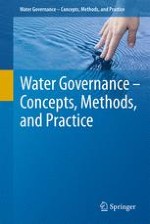2015 | Book Series

Water Governance - Concepts, Methods, and Practice
7 Volumes | 2015 - 2022
This book series aims at providing a platform for developing an integrated perspective on major advances in the field of water governance. Contributions will build bridges across established fields of expertise, across disciplinary perspectives, across levels from global to local and across geographical regions. Topics to be covered include conceptual and methodological advances capturing the complexity of water governance systems, institutional settings, actor constellations, diagnostic approaches, and comparative studies of governance systems. The book series encompasses monographs, textbooks and edited, coordinated volumes addressing one theme from different perspectives. The book series will address mainly a wider scientific audience, but will also provide valuable knowledge to interested practitioners. The sustainable management of fresh water resources and the ecosystem services that they provide is one of the key challenges of the 21st century. Many water related problems can be attributed to governance failure at multiple levels of governance rather than to the resource base itself. At the same time our knowledge on water governance systems and conditions for success of water governance reform is still quite limited. The notion of water governance aims at capturing the complexity of processes that determine the delivery of water related services for societal needs and that provide the context within which water management operates. Water governance is a fast growing field of scholarly expertise which has largely developed over the past decade. The number of publications in peer reviewed journals has increased from less than 20 in the year 2000 to nearly 400 in the year 2013. The increasing popularity of the term in science and policy has not lead to conceptual convergence but rather to an increasing vagueness and competing interpretations of how the concept should be understood, studied, and analyzed; which disciplines are involved; and what methodological approaches are most suitable for the study and analysis of water governance. The time seems to be ripe for comprehensive synthesis and integration.